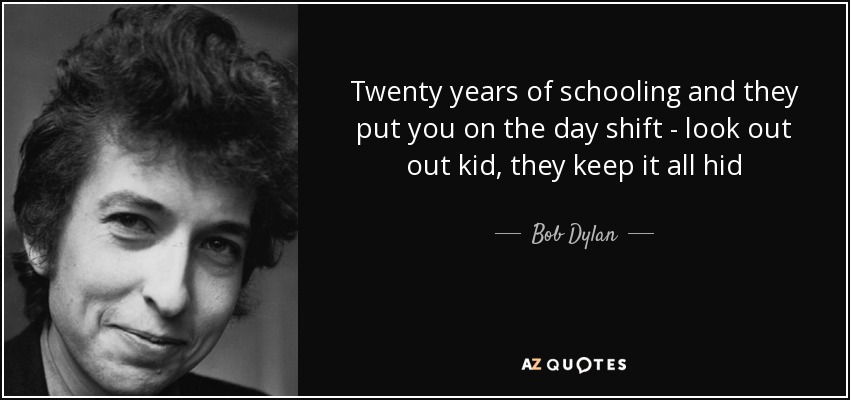
There’s an old notion from a guy named Paulo Freire about something called “Committing class suicide.” I think Adam Curtis articulates it well.
People who are the sort of the center of society at the moment . . . they would have a lot to lose from real political change because it really would change things in the structure of power . . . or [these are the brutal questions]: Do you just want things to change a little bit? Do you just want the banks to be a little bit nicer or people to be a little more respectful of each other’s identities? All of which is good, but basically you carry on living in your nice world where you tinker with it. There are millions of people out there who want change and the key thing is . . . you might have lots to lose, but they feel they’ve got absolutely nothing to lose. […] The forgotten thing about politics is that you give up some of your individualism to something bigger than yourself; you surrender yourself . . . you can spot real change happening when you see people from the liberal middle classes beginning to give themselves up to something [and] surrender themselves for something bigger. At the moment there is nothing like that in the liberal imagination.
Within education, those at the center of the system aim to maintain their class status because they do, in fact, have a lot to lose. The liberal imagination, or lack thereof, permits them to discern what aspects of educational policy allows for safe tinkering, but avoids any real change. Liberal administrators and full-time faculty comfortably promote diversity, equity, and the like because it exemplifies tinkering with no significant sacrifice. The bigger economic changes, liberatory and revolutionary, that might produce actual changes to the structure of power requires an overcoming or a surrender of the self in favor of the collective good for those with nothing to lose.
Here it is for your reading pleasure!:
Staffing is currently complete for Fall 2022… We are so very sorry that you have not been sent an offer yet when many of you have enjoyed consistent assignments for several years. This is obviously compounding uncertainty and stress during an already challenging time. We will begin reaching out in order by date of hire as previous assignments are turned down or if we get to add classes due to “waitlist demand”, which can happen in the lead-up to fall.
We realize this is probably cold comfort, but you are all good folks and remarkable teachers, so you deserve some explanation and clarity.
We have lost many classes each semester in the last three years–like virtually every college in the system–and those impacts are really starting to be felt. Our last healthy year was Fall 2019-Spring 2020. In Fall 2019, we offered 181 sections of English and Education across the whole District. To compare, this coming fall, we are left with 146 sections. So, we lost 35 sections primarily due to low enrollment/class cuts over the last three years. It’s very easy to see the immediate impacts of this on part-time faculty since 35 sections equate to 17-18 adjunct assignments. It’s starting to be especially devastating for folks hired or rehired since 2015-16 (as we must now schedule strictly by seniority per the contract).
Adding to this shortage, we have three full-time faculty coming back from sabbatical and teaching full loads in the fall. We are also hiring one FT faculty member. Plus, no one is taking a sabbatical next year, which always frees up some classes, so that’s easily the loss of an additional 7 or 8 adjunct positions this fall. The college is supposedly pouring a lot of funds into outreach to bring former students back and to recruit new students, so hopefully we start to bounce back soon.If you have any contractual questions and concerns, be sure to reach out to SCEA Pres. Rob Shaffer and Part-time Rep Geoff Johnson. [End of message]
It is fascinating how a comprehensive explanation involving numbers founded upon a concrete economic base serve as both an explanation of unemployment and a distancing from the responsibility of unemployment. It displays both power and impotence simultaneously: we exercise the structural power of admin and full-time positioning that produces your unemployment while we highlight our structural impotence to do anything to prevent it. It is an incredibly intriguing contradiction. It’s like unemployment is a virus and they have access to the medicine and they try to give some of the medicine to people who have the virus, but there simply isn’t enough medicine to go around. i.e., I have medicine and am trying to share it, but there isn’t enough medicine to share. There is a perverse guilt on display, or a tacit, “I know I am part of the problem, but it’s not just me.” or “Yes, I have a job and you don’t, but I am not entirely responsible for your unemployment, so please respect me for trying.”
Bob Dylan once sang: Twenty years of schoolin’ and they put you on the day shift.
At least they were put on the day shift. Now it’s: twenty years of schoolin’ and you’re unemployed.
